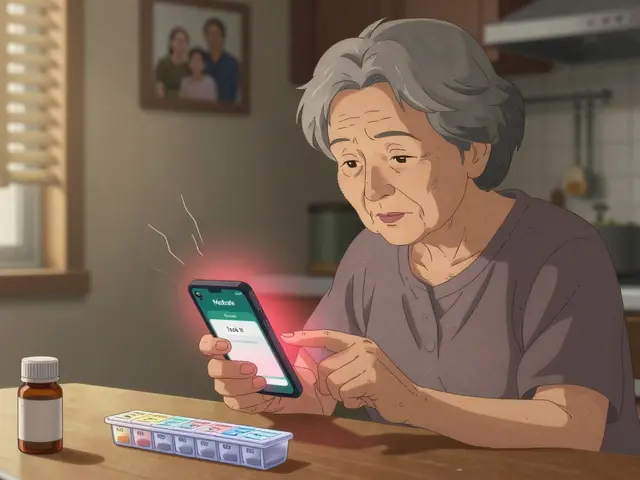
Did you know that ADHD shows up differently in girls? While boys often get labeled as 'hyperactive,' girls fly under the radar because their symptoms don't fit the stereotype. They're not bouncing off walls; they're quietly drifting off in class or being too hard on themselves for not being 'perfect.' Getting clued up on these subtle signs means we can support them better.
Girls with ADHD might be the daydreamers, the ones who seem lost in their thoughts, or even the overly sensitive ones. It's important to recognize that ADHD isn't just about being fidgety. It can be seen in emotions, like being easily upset or feeling overwhelmed with tasks that seem second nature to others. This often leads to underachievement, especially if their struggles go unnoticed.
Academically, girls with ADHD might face issues with planning and organization. They might know the answer but can't figure out how to start the problem or what steps to take next. This can be frustrating, but there are ways to help. Imagine if we could spot these signs earlier? Think about how different things could be for them with the right support.
- Breaking Stereotypes: Hidden ADHD Signs in Girls
- Emotional and Social Impacts
- Academic Challenges Faced by Girls
- Tips for Parents and Educators
Breaking Stereotypes: Hidden ADHD Signs in Girls
When we think of ADHD, most people picture a young boy unable to sit still in class. But here's a reality check: ADHD in girls can look completely different. They might be quieter, more introverted, and far less disruptive, but that doesn't mean they're not struggling. Let's break down these hidden signs.
Diving into the Mind: Daydreaming and Distraction
Girls with ADHD often find themselves lost in their thoughts, which can be mistaken for simply 'being dreamy.' This isn't just a casual daydream though — it's a consistent pattern where they might miss out on important parts of conversations or instructions in class, leading to misunderstandings or academic struggles.
The Silent Struggle: Emotional Sensitivity
While boys with ADHD might act out, girls often internalize stress. They're often more sensitive emotionally. Small criticisms can feel huge, leading to anxiety or low self-esteem. These emotional reactions aren't just teenage angst; they're signs that could point toward ADHD.
Perfectionism and Overcompensation
Some girls with ADHD counteract their challenges with excessive perfectionism. They spend hours on tasks, desperately trying to stay on top. This overcompensation, however, often leads to burnout and could be another hidden sign of ADHD.
Social Challenges
Girls with ADHD may have a tough time navigating social settings. They might talk excessively or interrupt conversations, not out of rudeness but rather impulsivity, which affects their ability to form and maintain friendships.
By understanding these less obvious symptoms, we can help more girls get the support they need. If you're a parent, teacher, or just a friend, spotting these signs early can make a huge difference. Remember, just because it doesn’t fit the stereotype, doesn't mean it's not ADHD.
Emotional and Social Impacts
When it comes to ADHD in girls, emotions can run high and social life might take a hit. Unlike boys who might show their struggles more outwardly, girls often internalize their feelings, which can lead to anxiety and low self-esteem. It's not just about being 'moody'—these are serious emotional impacts that stem from the challenges they face.
They might struggle with friendships because they can be misunderstood as being overly shy or too sensitive. Girls with ADHD often worry about fitting in and are very hard on themselves if they feel different from their peers. This can make it tough for them to maintain friendships, especially in social settings where they might feel overwhelmed or left out.
Feeling Overwhelmed
Keeping up with conversations, remembering social cues, or even just choosing the right words can be overwhelming. These girls often feel like they're on the outside looking in, which can lead to social isolation. This isn't just tough on their emotions; it also affects their ability to hone social skills.
The Question of Self-Esteem
Because their struggles are mostly invisible, girls with ADHD might get labeled as careless or lazy, and this repeated misunderstanding can chip away at their self-esteem. They might believe that they're not good enough, which is far from the truth.
| Common Emotional Impacts | Possible Effects |
|---|---|
| Anxiety | Panic attacks, sleep issues |
| Low Self-Esteem | Avoidance of social situations, reluctance to try new things |
| Social Isolation | Lack of friendships, withdrawal from group activities |
Supporting these girls involves understanding these emotional storms and offering help without judgment. Encouragement, patience, and targeted strategies can make a world of difference, paving the way for more confidence and social success.

Academic Challenges Faced by Girls
ADHD doesn't just mess with your attention; it can really make school tough for girls. Imagine being in class, wanting to do well, but getting lost because everything seems jumbled. That's what happens when ADHD sneaks into the classroom. It's not always about not paying attention; it's about struggling to organize thoughts and work.
Planning and Organization
Girls with ADHD often have a hard time with planning and organizing their schoolwork. It's like knowing you have all the puzzle pieces but can't figure out where they fit. They might have the answers in their heads but struggle to put them on paper in a logical way.
This struggle can affect everything from writing essays to tackling math problems. Without a clear step-by-step approach, tasks feel overwhelming. Creating to-do lists or using planners can make a big difference here, breaking down tasks into manageable chunks.
Time Management
Managing time is another biggie. While it sounds simple enough, girls with ADHD might feel like they're always racing against the clock. Assignments pile up, and they might start one project but get distracted by another. This often leads to a last-minute rush or incomplete work.
A practical tip is setting alarms and using timers to keep on track. Visual timers or clocks help with staying focused on one task at a time.
Focus and Attention
Daydreaming can be a major challenge, leading to missed instructions and key details. It's not about not caring; their brains are like fast-moving trains, hard to stop once they get going. Focusing on mindfulness techniques or breaks can help regain focus.
Here’s a surprising fact: some studies show that 60% of girls with ADHD are overlooked in typical classroom settings. This just highlights why teachers need to understand these differences so they can offer better support.
Parents and educators can work together to create an environment that supports these students. Simple changes, like breaking tasks into smaller steps or allowing more time for certain assignments, can make schoolwork less daunting.
Tips for Parents and Educators
Helping girls with ADHD is all about understanding their unique needs. Here are some practical tips to make a real difference.
Encourage Open Communication
Make sure your child or student feels comfortable talking about what they’re going through. Create a space where they can express feelings without judgment. Sometimes just listening can work wonders for their confidence.
Teach Organization Skills
Girls with ADHD often struggle with organization, so teaching them these skills can be a game-changer. Use planners, checklists, or even digital apps to help them keep track of tasks and homework. It's all about small steps that build lasting habits.
Set Clear Routines
Structure helps reduce anxiety. Try to establish clear daily routines at home and in the classroom. Consistent meal times, study hours, and bedtime rituals can help them feel more settled and in control.
Provide Regular Feedback
Positive reinforcement can boost their self-esteem. Regular, constructive feedback helps them stay on track. Celebrate their successes, no matter how small, and guide them through their challenges with patience.
Collaborate with Professionals
Don't hesitate to reach out to specialists like psychologists or ADHD coaches. Early intervention by experts can make a significant impact. They can offer tailored strategies to support both the child and the family.
Focus on Strengths
Every child has unique strengths. Help girls with ADHD tap into their interests and talents. Whether it’s art, sports, or something else, nurturing these areas can build their confidence and motivation.







13 Comments
ADHD in girls ain't some trendy diagnosis bro. It's neurodivergence wearing a bow and smiling through the chaos. They're not lazy-they're running on a CPU that overheats from social noise. You ever try multitasking while your amygdala's screaming? Yeah. That's Tuesday for them.
And don't get me started on perfectionism. It's not 'trying hard.' It's survival mode with glitter on.
Teachers see quiet. They don't see the internal firewalls crashing every 17 minutes.
YES. This is everything. I'm a therapist and I've seen so many girls in their 20s finally get diagnosed after years of being called 'too sensitive' or 'spacey.'
They were just trying to survive school with a brain wired for fireworks in a world that wanted candlelight.
Organization tools? Yes. But also-validation. They need to hear 'this isn't your fault' more than they need a planner.
And teachers? Please stop saying 'just focus.' That's like telling someone with a broken leg to 'just walk faster.' 😔
Okay but let's be real-this whole 'ADHD in girls' narrative is just another way for middle-class white moms to turn their privileged kids' laziness into a medical condition. You think a girl in a rural Nigerian village is getting diagnosed because she zones out in class? No. She's just hungry or walking 5 miles to school.
This is capitalism weaponizing neurodiversity. You're not helping girls-you're monetizing their suffering with fidget spinners and $300 coaching packages.
And don't even get me started on 'perfectionism as a symptom.' That's just anxiety dressed up in a pink notebook. Stop pathologizing normal teenage stress.
Also-why is everyone ignoring the fact that 70% of these 'diagnoses' happen after a parent watches a YouTube video? We're turning mental health into a TikTok trend.
And the worst part? The girls who actually need help-the ones without insurance, without supportive parents, without a voice-are still invisible. This post is performative allyship with a side of self-congratulation.
My niece was diagnosed at 14. She used to cry every night because she 'knew the answers but couldn't write them down.'
Her teacher told her she was 'too dramatic.'
Now she's in college, uses speech-to-text for essays, and still hates group projects-but she finally knows why.
Also-yes to visual timers. My whole family uses them now. Life changed.
And no, she's not 'overdiagnosed.' She's just finally seen.
❤️
Thank you for writing this. I’ve been telling my sister for years that her 'overthinking' wasn't just being 'high maintenance'-it was executive dysfunction.
She finally got tested last year. Her first reaction? 'So I'm not broken?'
That broke my heart.
Also-perfectionism is the loudest scream no one hears. 🫂
Parents: stop praising 'hard work' and start praising 'effort with support.'
Teachers: give extensions. Don't assume laziness.
Girls: you're not failing. The system is.
What's the actual prevalence difference between boys and girls in under-resourced communities? I'm curious if this is a diagnostic bias or a true neurobiological difference.
Also-any studies on how cultural expectations in non-Western countries affect symptom expression? Like in India or Nigeria, where emotional restraint is normalized, does ADHD just look like 'obedient silence'?
Girls in India? They don't get diagnosed. They get told to 'be quiet,' 'be a good girl,' 'don't make a scene.'
My cousin was called 'dull' in school because she never raised her hand. Turns out she couldn't process the question fast enough. Now she's 28 and still blames herself for 'not being smart enough.'
No one in my family even knew ADHD could look like this.
Stop acting like this is a Western problem. It's a global silence.
Look I get it but this whole thing is just another way for privileged women to feel special about their trauma. You think your daughter's daydreaming is ADHD? Maybe she's just bored because her school is too easy.
And don't even get me started on 'emotional sensitivity'-that's just bad parenting wrapped in a neurodiversity bow.
My nephew was diagnosed at 8. Now he's 16 and still can't tie his shoes. But hey-his mom posted a TikTok about it so now she's a 'champion.'
Real problem? Lack of discipline. Not dopamine deficiency.
Also-why is no one talking about how meds are overprescribed? This isn't science. It's a marketing campaign.
Wake up. Stop letting corporations label your kids as broken so they can sell you solutions.
There’s a deeper truth here that no one wants to admit: society rewards girls for being quiet, compliant, and self-sacrificing. ADHD isn’t hidden-it’s rewarded until it isn’t.
When she’s 12 and zoning out in class? Cute. When she’s 22 and zoning out in a job interview? Unprofessional.
So the system doesn’t fail girls with ADHD-it trains them to fail themselves.
Perfectionism isn’t a symptom. It’s the survival tactic.
And you? You’re still asking for 'tips for parents' like this is a problem to be fixed instead of a society to be dismantled.
I have to say-this entire post feels like a performative pity party for upper-middle-class white girls. Let me ask you this: what about the Black girls in urban schools who are labeled 'disruptive' and sent to the principal's office for the same behaviors? What about the girls in foster care who never get assessed? What about the girls in refugee camps?
You're not helping. You're commodifying neurodivergence for clicks.
And don't get me started on 'emotional sensitivity'-that's just code for 'she's too dramatic.' We've been doing this since the 1800s.
ADHD isn't a gendered condition. It's a systemic failure to recognize trauma, poverty, and racism as root causes.
Stop pathologizing girls. Start fixing the world.
OMG I’m literally crying right now. My daughter was diagnosed last year and I thought I was the only one who saw it.
She used to say 'I’m just stupid' every time she forgot her homework.
Now she says 'I have ADHD, and that’s why I need help.'
And you know what? She’s the smartest kid in her class.
Teachers still don’t get it. But I do.
Also-can we PLEASE stop calling it 'daydreaming'? It’s not cute. It’s dissociation.
And yes-visual timers saved us. 🥹✨
Wow. So we're just supposed to accept that girls with ADHD are 'quietly suffering' while the system ignores them? What a revolutionary idea.
Meanwhile, the boys are medicated, the girls are labeled 'moody,' and the parents are told to 'try harder.'
And the real tragedy? We're still talking about this like it's a surprise.
It's not. It's been happening since the 1970s.
And now we're making it a Pinterest board.
Good job, everyone. We've turned trauma into a wellness aesthetic.
My daughter just said: 'Mom, I don’t need to be fixed. I just need you to understand why I can’t do it the way they want.'
That hit harder than any diagnosis.
She’s 10.
And she’s already smarter than half the adults in this thread.
❤️